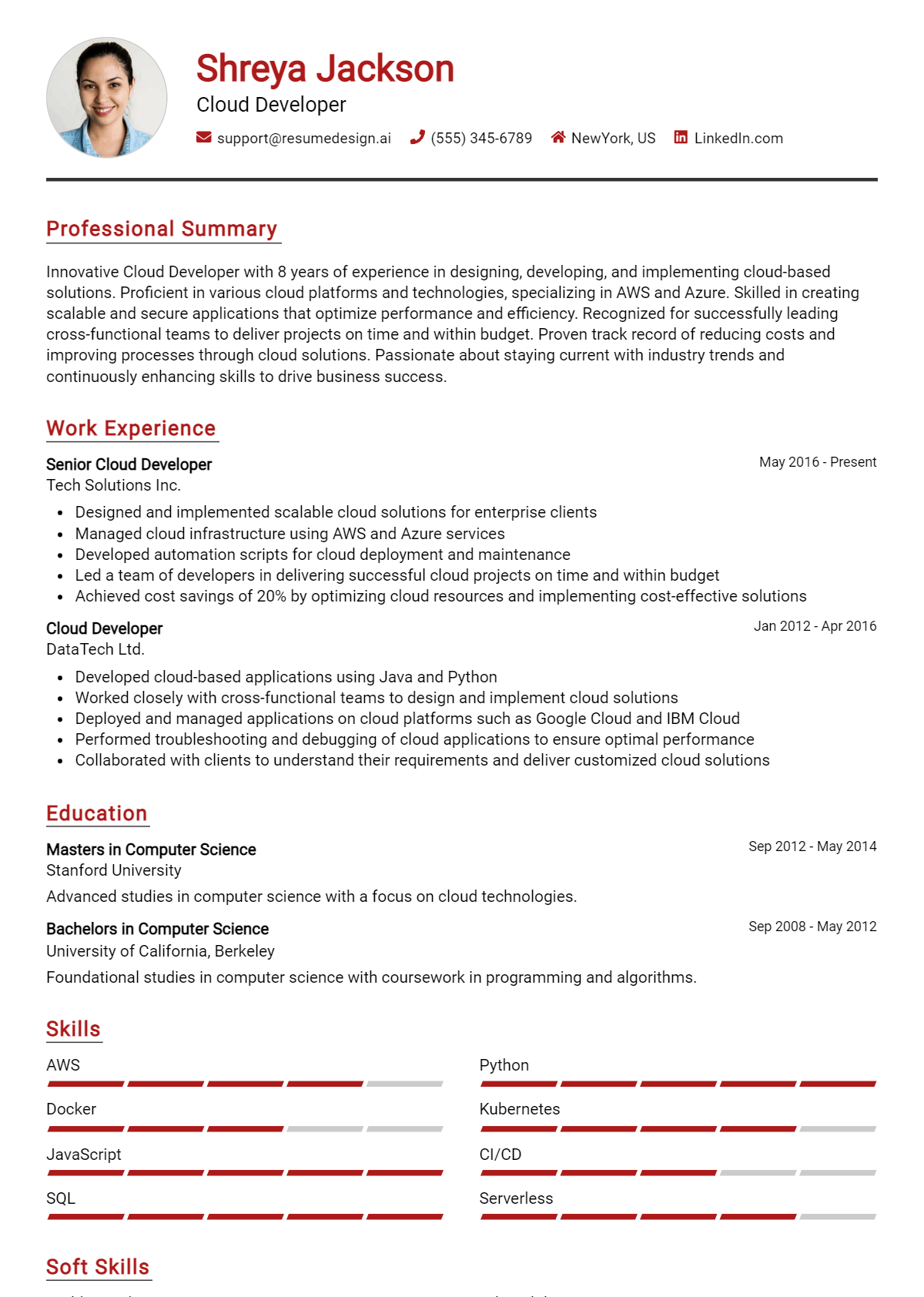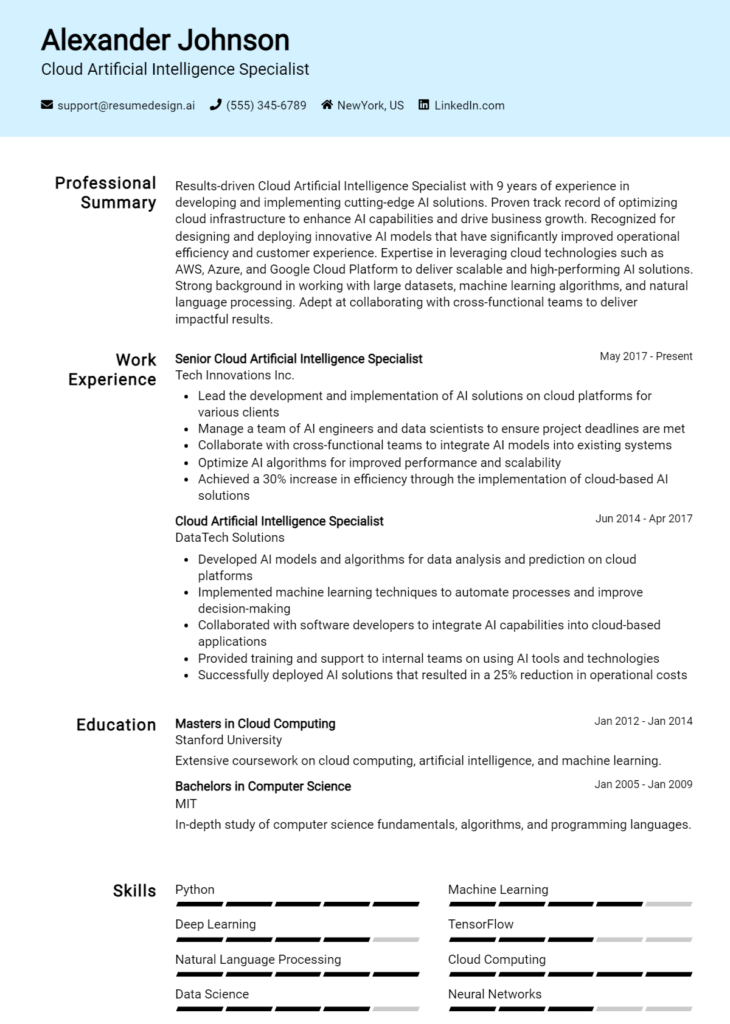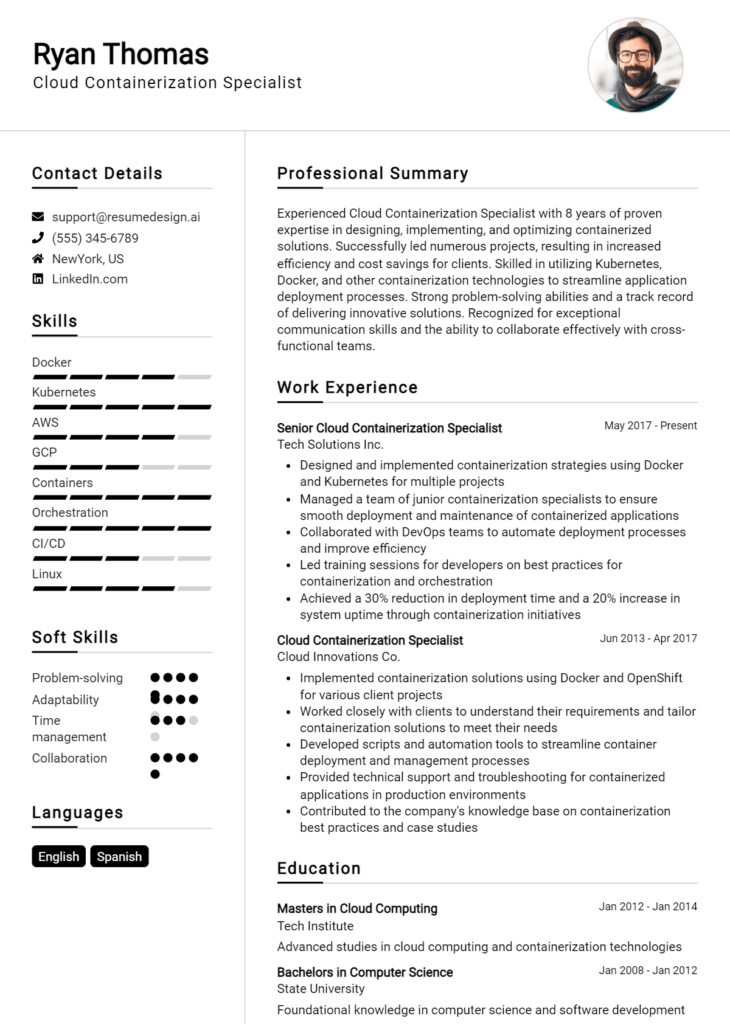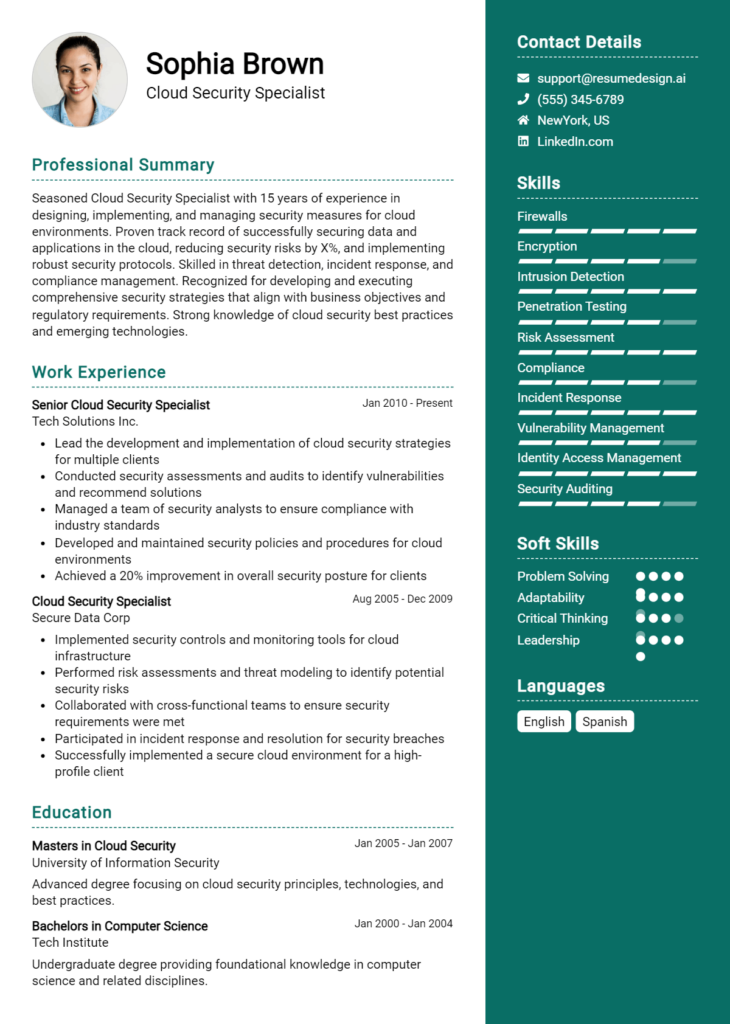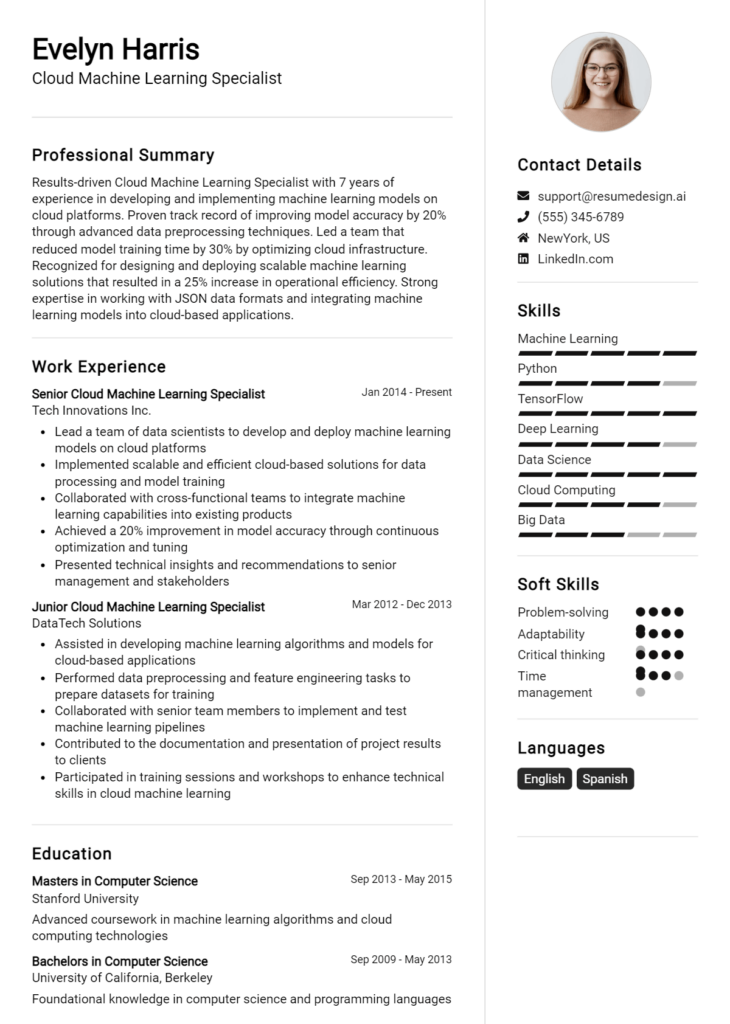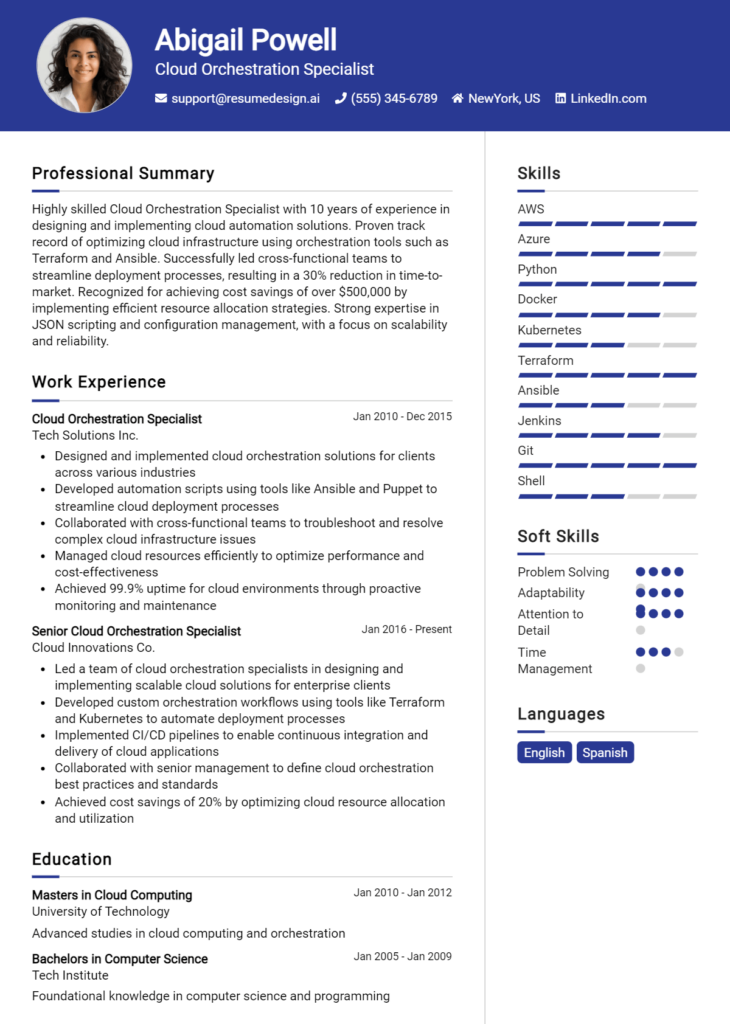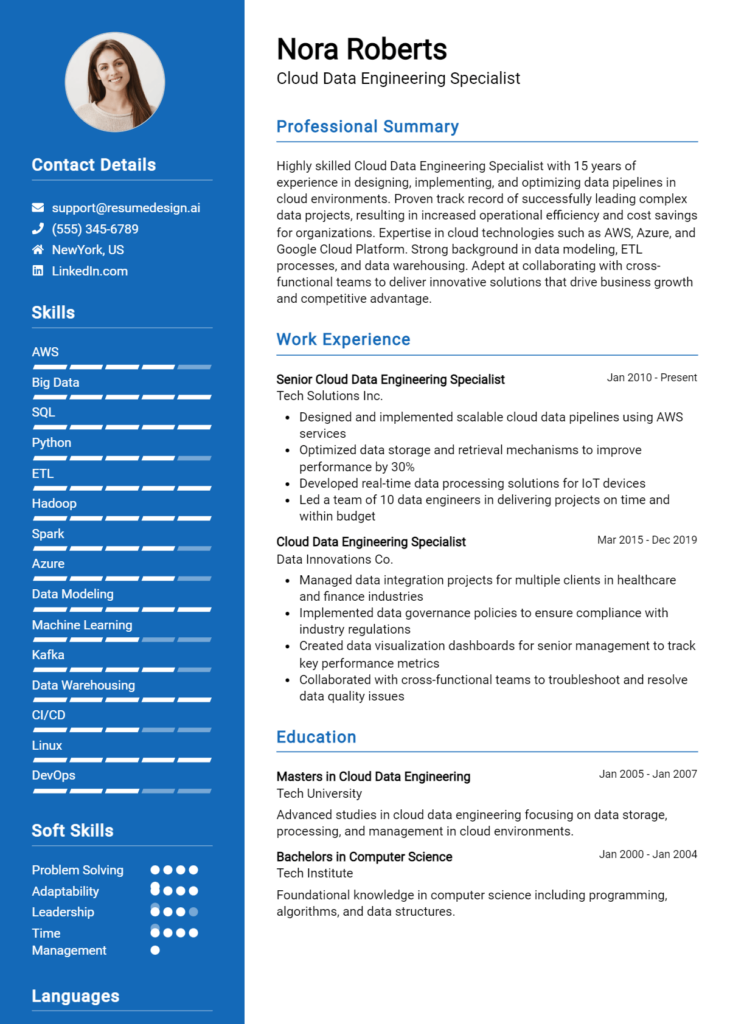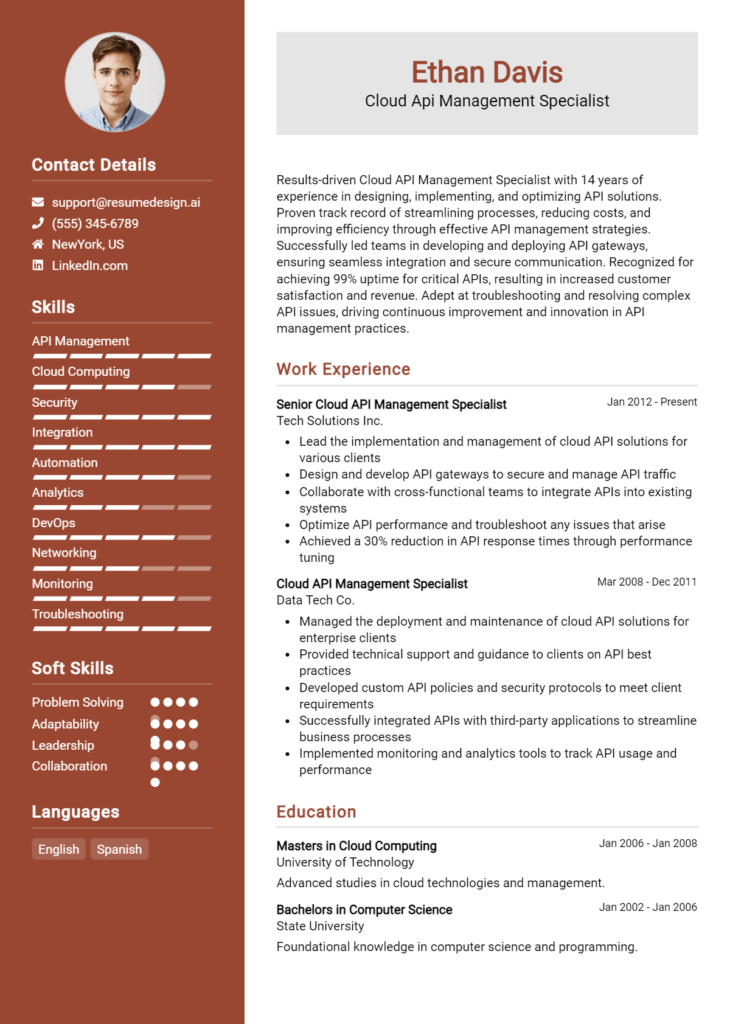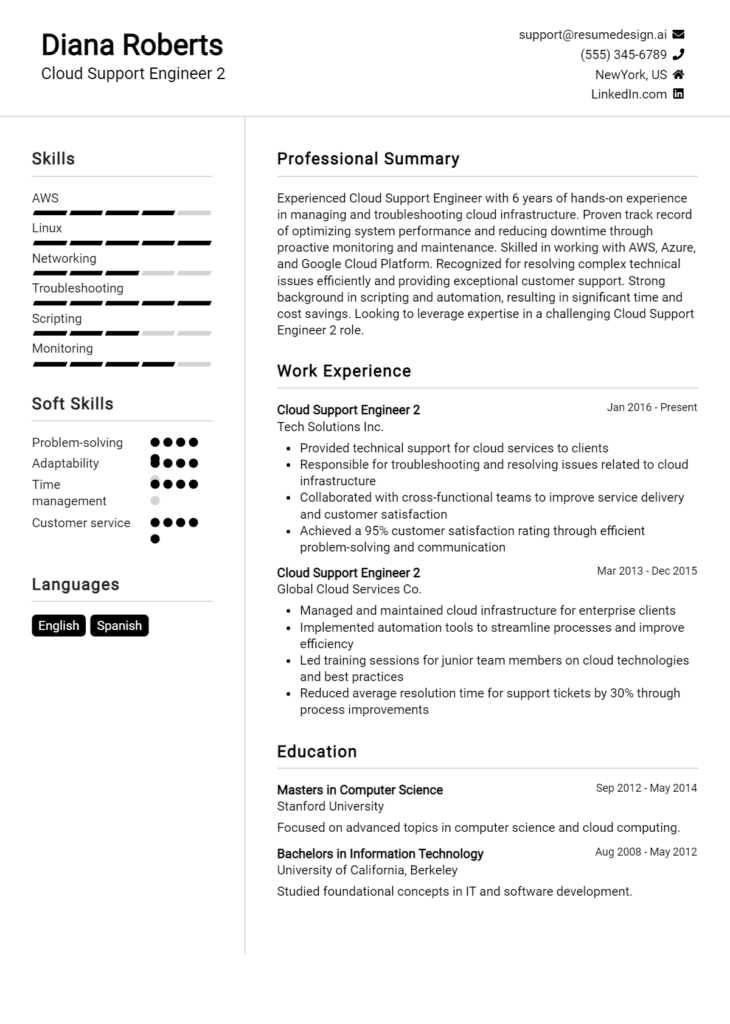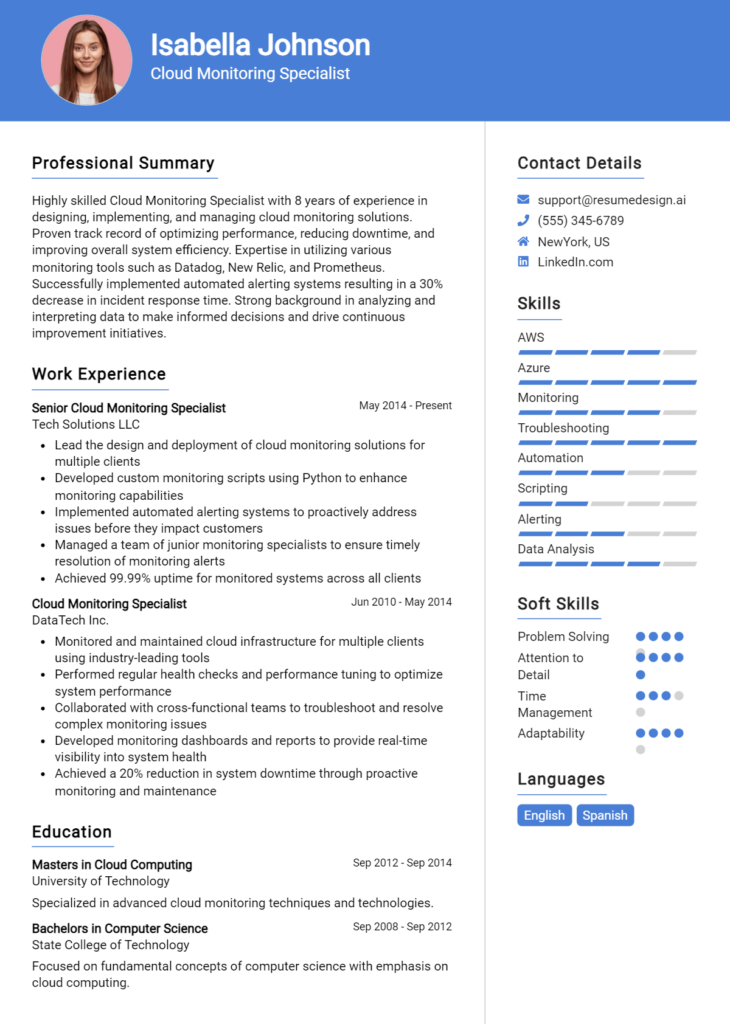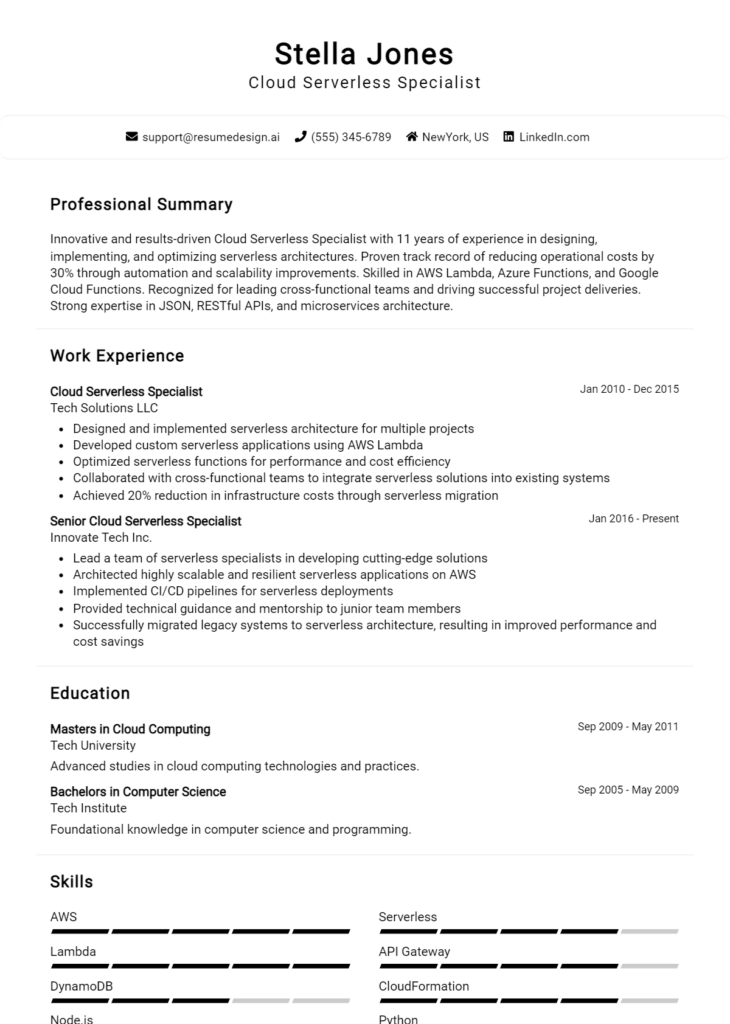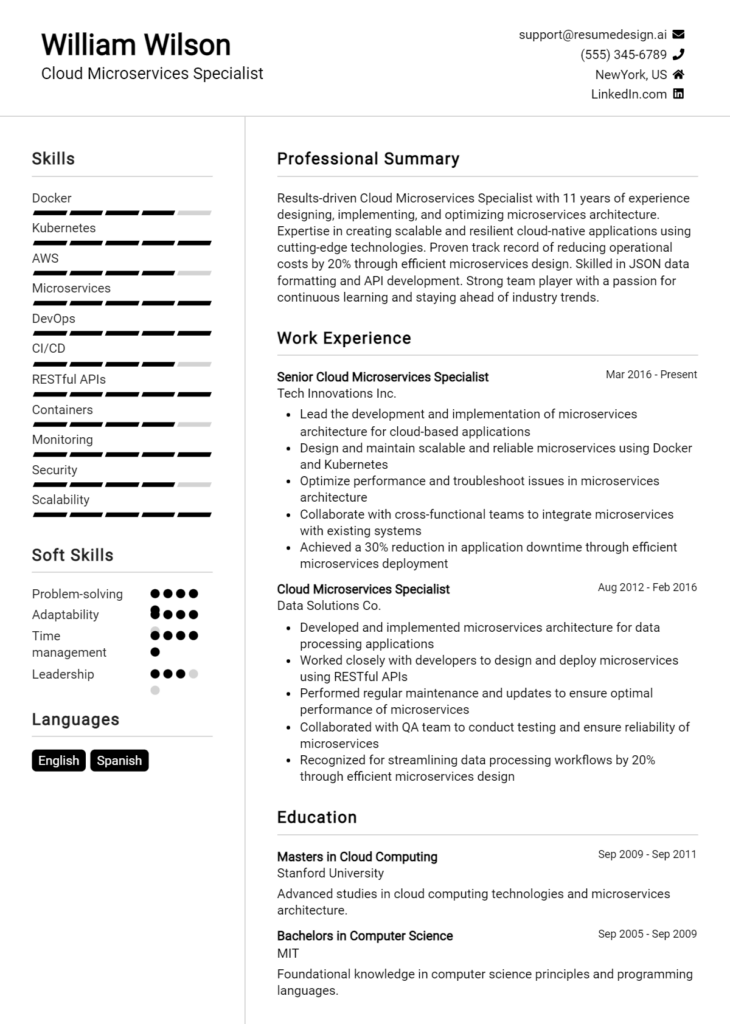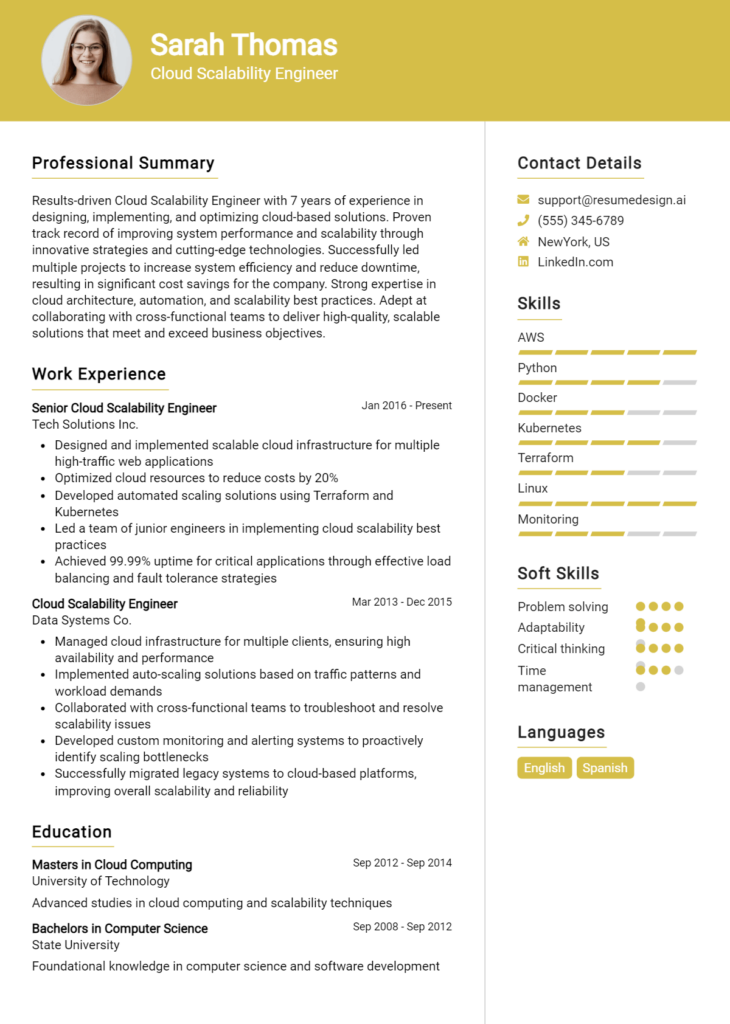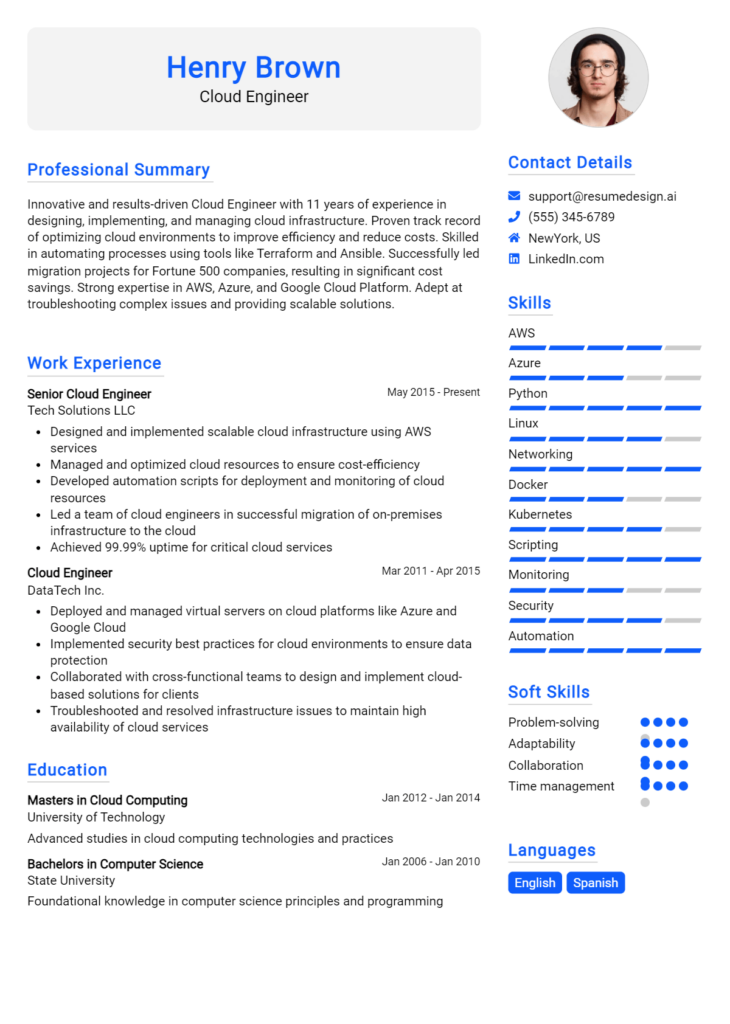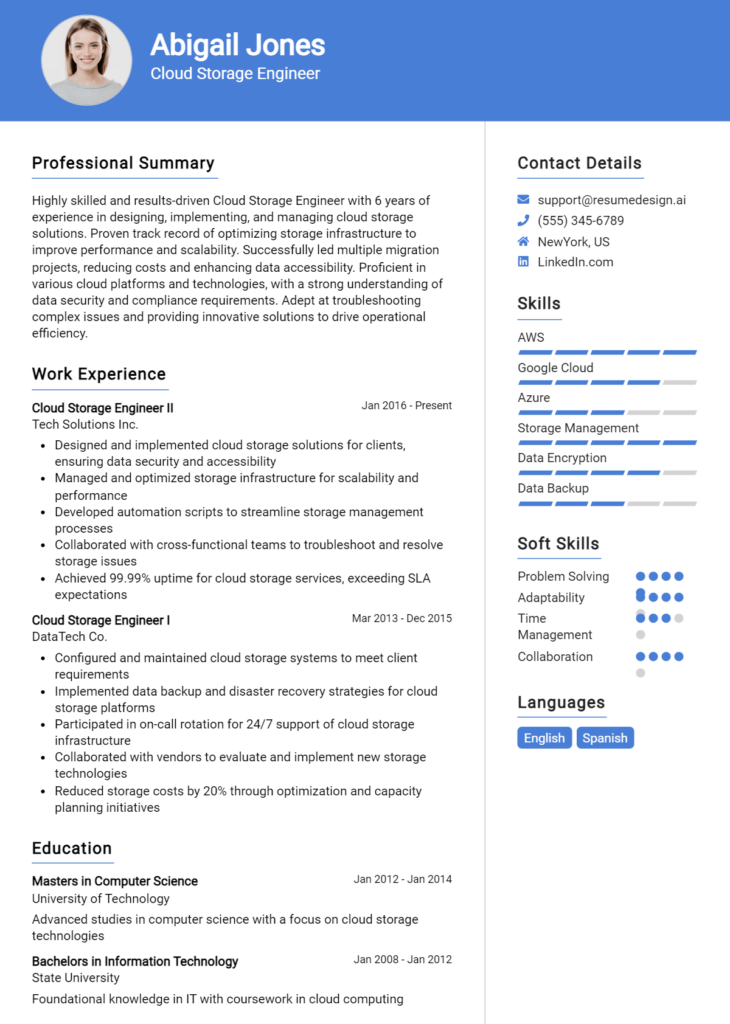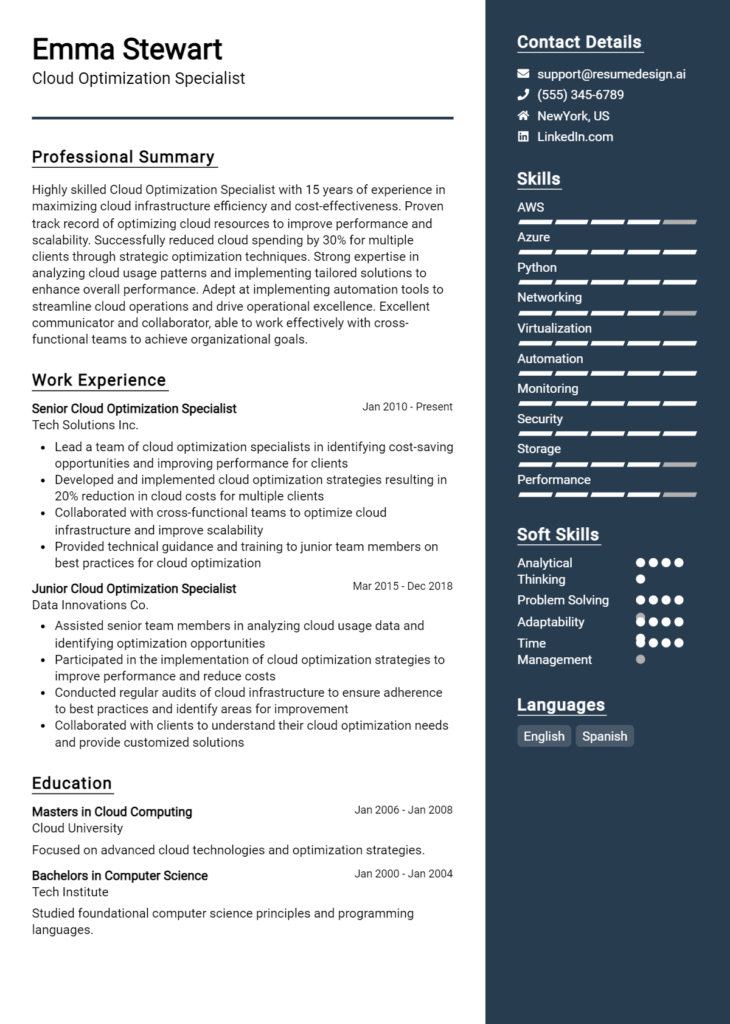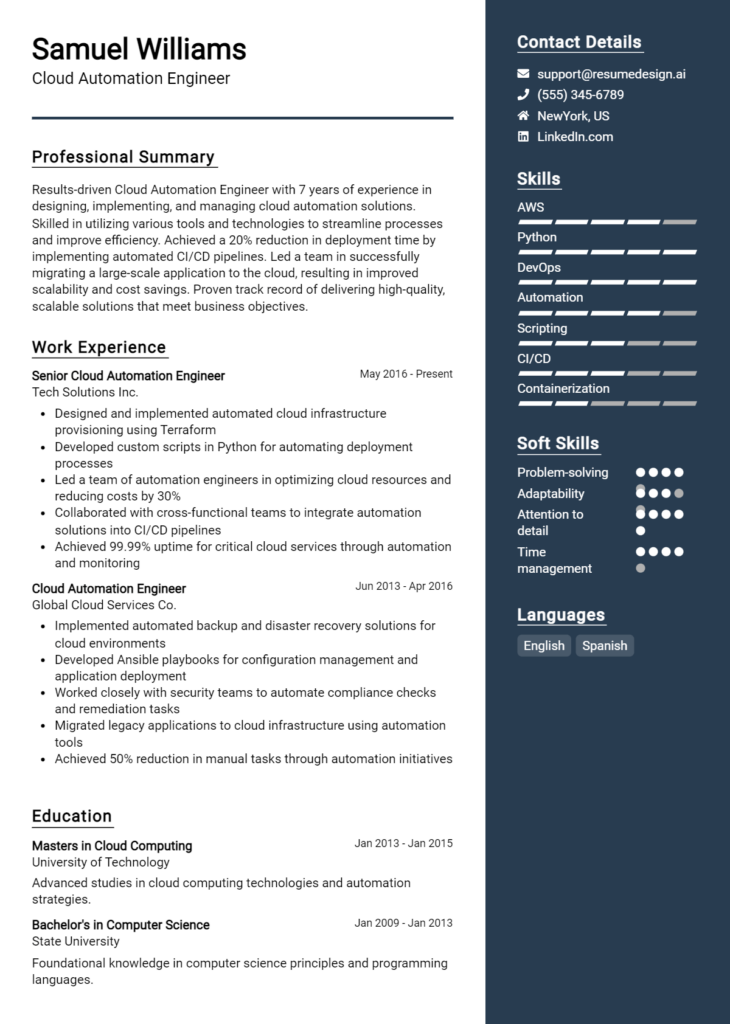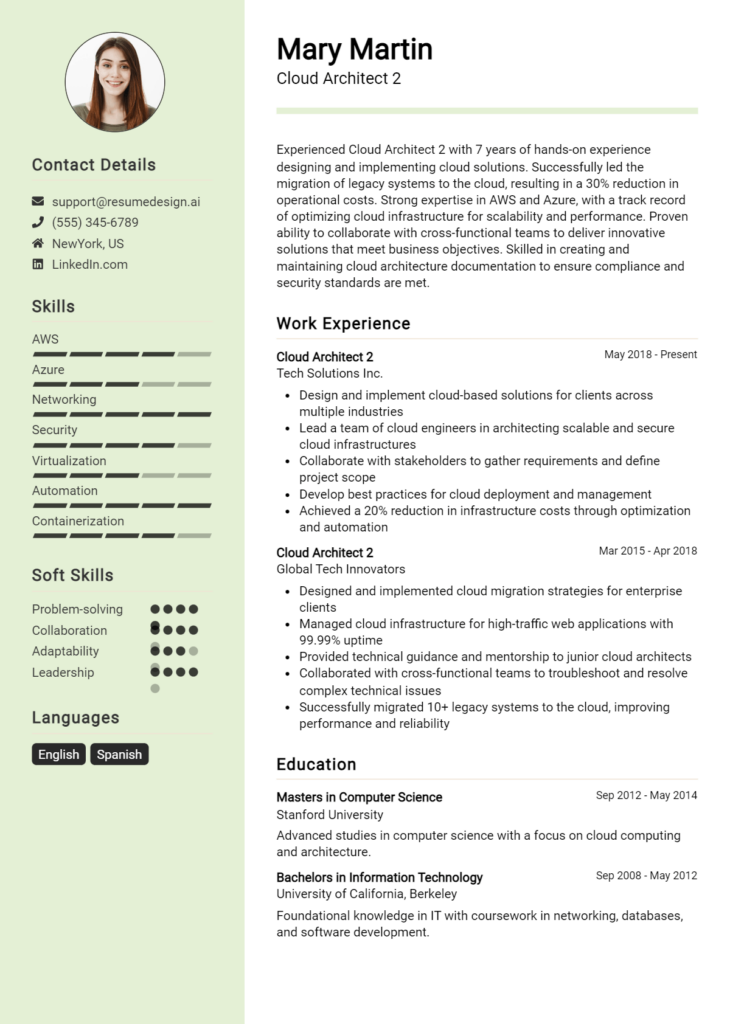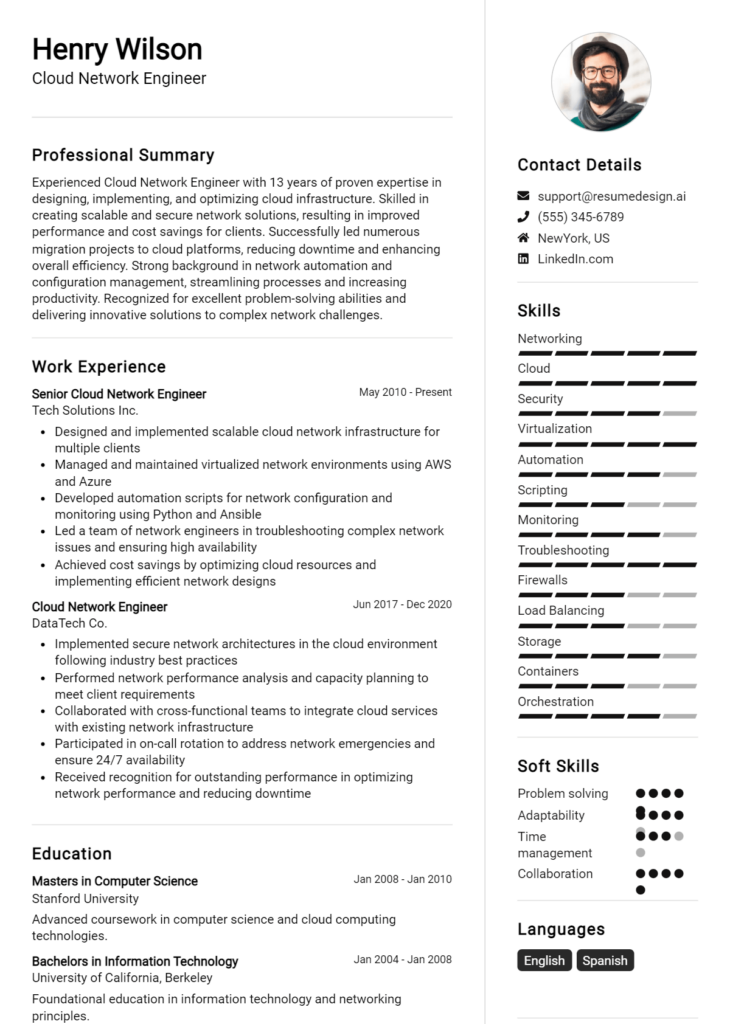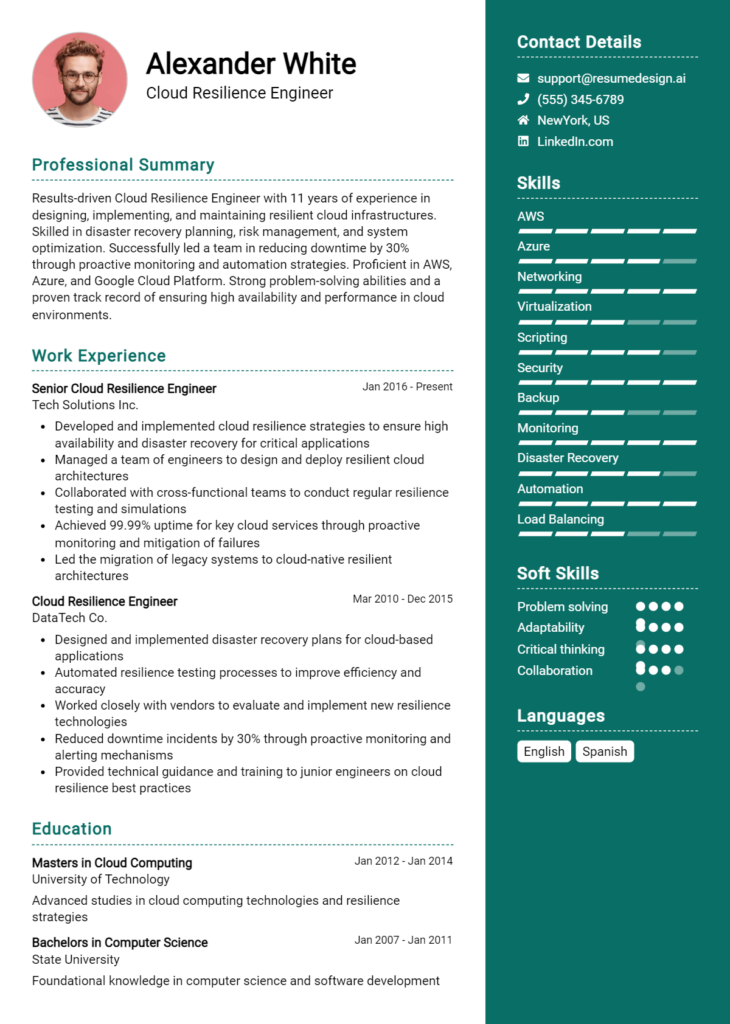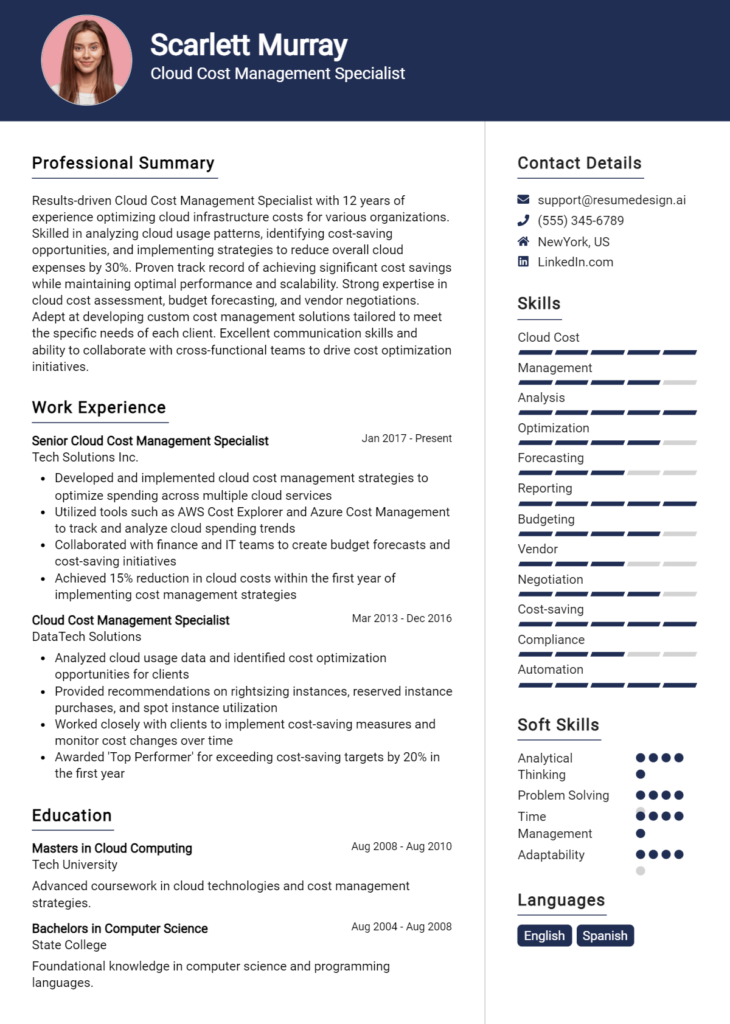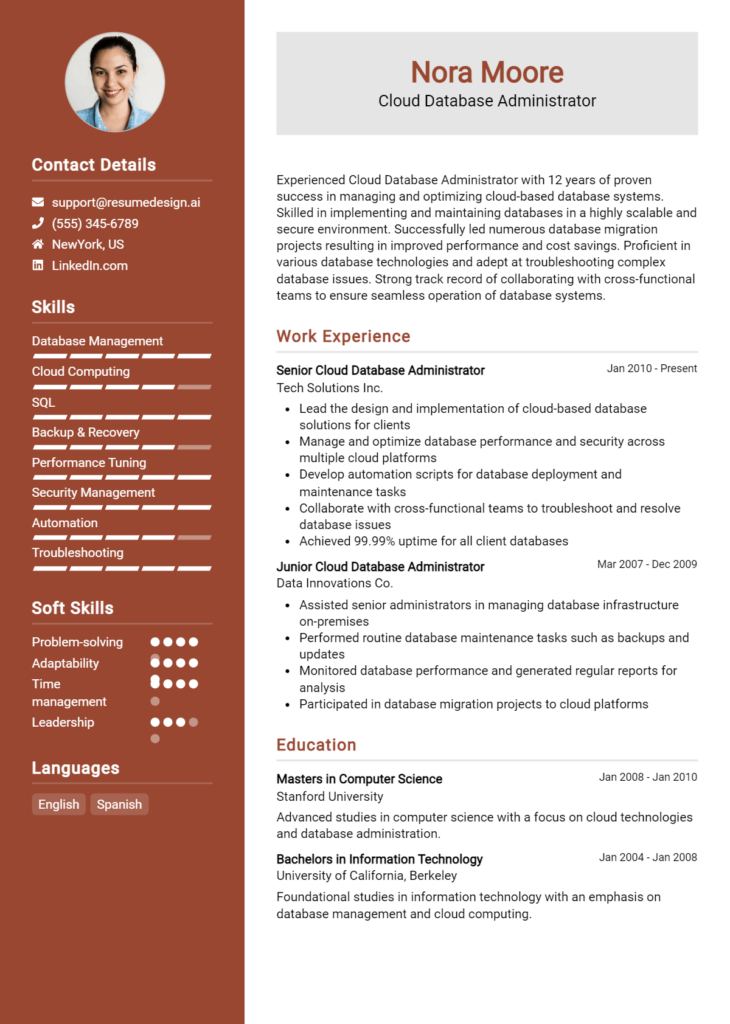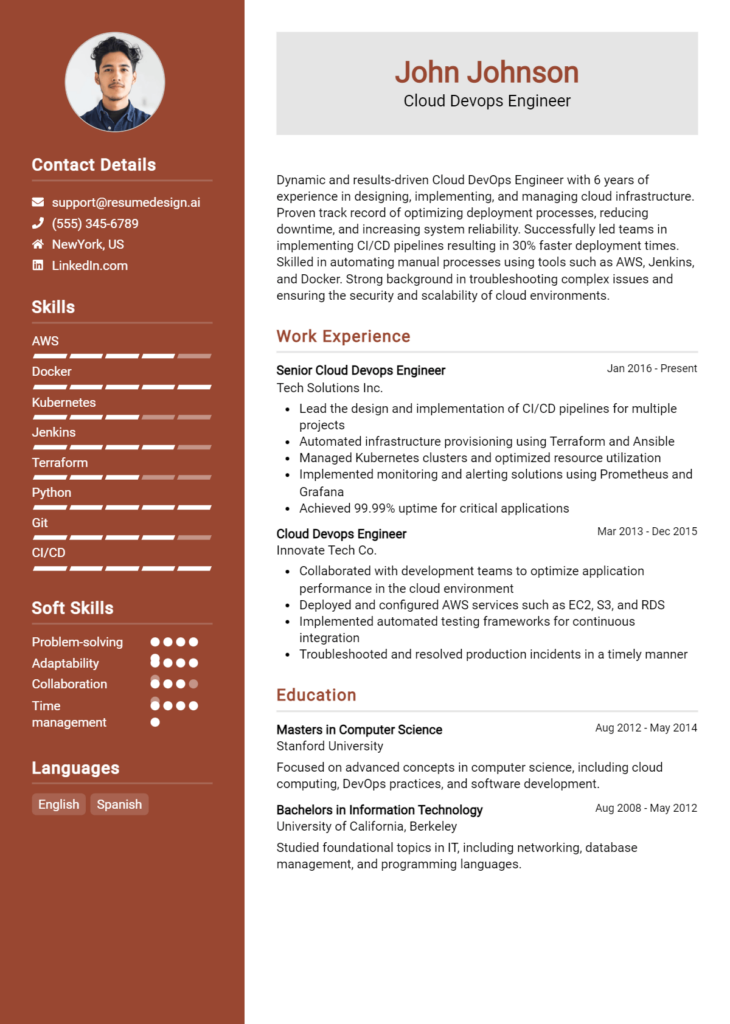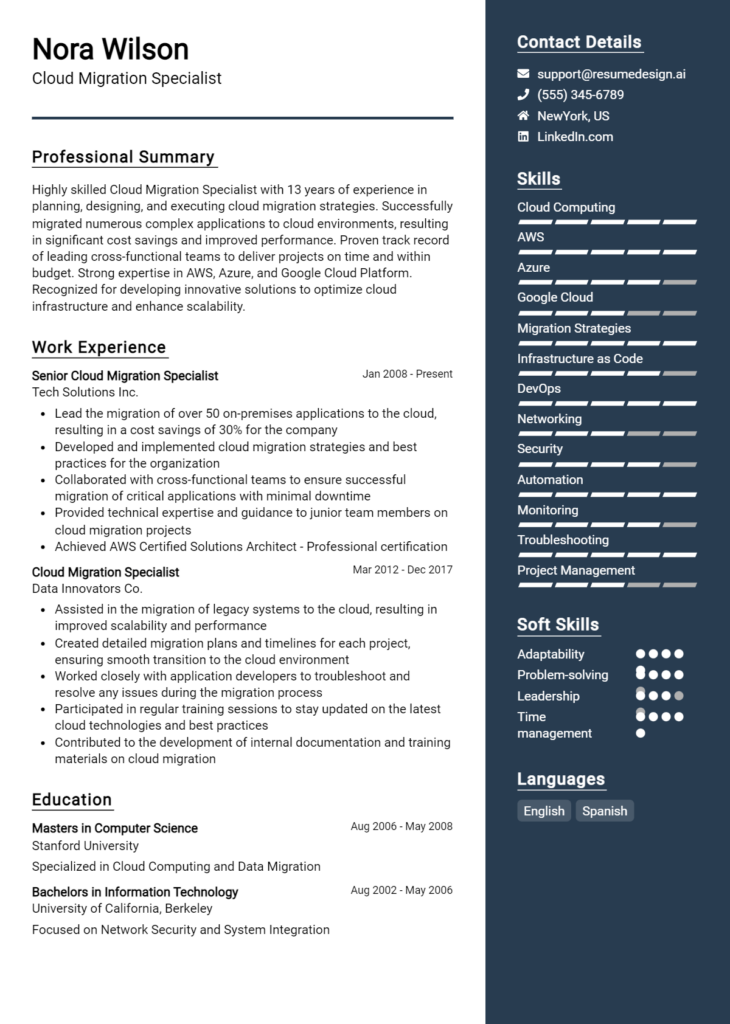Cloud Developer Core Responsibilities
A Cloud Developer plays a crucial role in designing, implementing, and managing cloud-based applications and services, effectively bridging various departments such as IT, operations, and business strategy. Key responsibilities include developing cloud solutions, ensuring security and compliance, and optimizing application performance. Essential skills encompass technical proficiency in cloud platforms, operational awareness, and strong problem-solving abilities. These competencies are vital for achieving organizational goals. A well-structured resume can effectively highlight these qualifications, making a candidate stand out in a competitive job market.
Common Responsibilities Listed on Cloud Developer Resume
- Design and develop cloud-native applications and services.
- Implement cloud infrastructure solutions using platforms like AWS, Azure, or Google Cloud.
- Optimize existing applications for performance and scalability.
- Ensure compliance with security standards and best practices.
- Collaborate with cross-functional teams to gather requirements and define solutions.
- Monitor and troubleshoot cloud environments for reliability and efficiency.
- Automate deployment processes using CI/CD tools.
- Conduct cost analysis and resource optimization strategies.
- Maintain documentation for cloud architecture and services.
- Stay updated with industry trends and advancements in cloud technology.
High-Level Resume Tips for Cloud Developer Professionals
In today's competitive job market, a well-crafted resume is crucial for Cloud Developer professionals looking to stand out. Your resume is often the first impression you make on a potential employer, making it essential to capture attention with a clear representation of your skills and achievements. A strong resume not only showcases your technical prowess but also conveys your ability to deliver innovative cloud solutions. This guide will provide practical and actionable resume tips specifically tailored for Cloud Developer professionals, ensuring you present yourself as a top candidate in the ever-evolving cloud computing landscape.
Top Resume Tips for Cloud Developer Professionals
- Tailor your resume to the job description by incorporating keywords and phrases that reflect the specific requirements of the position.
- Highlight relevant experience with cloud platforms (such as AWS, Azure, or Google Cloud) and specific technologies you've worked with.
- Quantify your achievements by using metrics, such as cost savings, performance improvements, or successful project completions.
- Showcase your certifications, as they demonstrate your commitment to professional development and expertise in cloud technologies.
- Include a technical skills section that lists programming languages, tools, and frameworks relevant to cloud development.
- Emphasize your understanding of DevOps practices and how they integrate with cloud development.
- Utilize action verbs to describe your contributions and impact in previous roles, such as "developed," "implemented," or "optimized."
- Keep your format clean and professional, using bullet points for easy readability and ensuring your resume is concise.
- Consider adding a brief summary statement at the top that encapsulates your expertise and career goals in cloud development.
- Be prepared to update your resume regularly to reflect new skills, experiences, and industry trends.
By implementing these tips, Cloud Developer professionals can significantly enhance their resumes, making them more appealing to potential employers. A well-structured resume that effectively highlights your skills, achievements, and relevant experiences increases your chances of landing a job in the dynamic and rapidly expanding field of cloud development.
Why Resume Headlines & Titles are Important for Cloud Developer
In the competitive landscape of cloud development, a well-crafted resume is essential for standing out among a pool of qualified candidates. The resume headline or title serves as a critical first impression, encapsulating a candidate's key qualifications in a succinct and impactful manner. A strong headline can immediately capture the attention of hiring managers, providing a snapshot of the applicant’s expertise and suitability for the role. It should be concise, relevant, and directly aligned with the job being applied for, ensuring that the candidate’s core competencies are presented front and center.
Best Practices for Crafting Resume Headlines for Cloud Developer
- Keep it concise, ideally under 10 words.
- Make it role-specific, reflecting the cloud developer position.
- Use industry-relevant keywords to enhance visibility.
- Highlight key skills or technologies that are in demand.
- Showcase accomplishments or years of experience if applicable.
- Avoid generic terms; be specific about your expertise.
- Make it impactful by using strong action words.
- Ensure it resonates with the job description provided by the employer.
Example Resume Headlines for Cloud Developer
Strong Resume Headlines
"Certified Cloud Developer with 5+ Years of Experience in AWS and Azure"
"Innovative Cloud Solutions Architect with Proven Track Record of Successful Deployments"
“DevOps Specialist with Expertise in CI/CD Pipelines and Cloud Infrastructure Automation”
“Results-Driven Cloud Developer Skilled in Microservices and Serverless Architecture”
Weak Resume Headlines
“Looking for a Job”
“Experienced Developer”
“Cloud Computing Professional”
The strong headlines are effective because they are specific, showcasing relevant skills, certifications, and experience that directly pertain to the cloud developer role. They provide hiring managers with a clear and immediate understanding of the candidate's qualifications and what sets them apart. In contrast, the weak headlines fail to convey any meaningful information, relying on vague terms that do not highlight the candidate’s strengths, making them easily forgettable in a sea of resumes.
Writing an Exceptional Cloud Developer Resume Summary
In today’s competitive job market, a well-crafted resume summary is essential for a Cloud Developer to stand out among numerous applicants. This concise introduction serves to capture the attention of hiring managers by effectively highlighting relevant skills, experience, and accomplishments tailored to the specific role. A strong summary not only sets the tone for the resume but also provides a quick overview of the candidate's qualifications, making it easier for hiring managers to assess fit and potential contributions to their organization.
Best Practices for Writing a Cloud Developer Resume Summary
- Quantify Achievements: Use numbers and metrics to demonstrate your impact in previous roles.
- Focus on Relevant Skills: Highlight technical skills specific to cloud development such as AWS, Azure, or containerization.
- Tailor for the Job Description: Customize your summary to align with the specific requirements of the position you are applying for.
- Be Concise: Aim for 3-5 sentences that convey your qualifications without unnecessary jargon.
- Showcase Key Accomplishments: Mention notable projects or initiatives that showcase your capabilities.
- Use Industry Keywords: Incorporate terms and phrases relevant to cloud development to pass through applicant tracking systems.
- Highlight Soft Skills: Include interpersonal skills such as collaboration and problem-solving that complement your technical abilities.
- Maintain a Professional Tone: Ensure your writing style reflects professionalism and confidence.
Example Cloud Developer Resume Summaries
Strong Resume Summaries
Results-driven Cloud Developer with over 5 years of experience in designing and deploying scalable cloud solutions, leading to a 30% reduction in operational costs for a major client. Proficient in AWS, Azure, and Kubernetes, with a strong focus on automation and efficiency.
Dynamic Cloud Developer specializing in serverless architecture and microservices, successfully migrated legacy systems to cloud environments, achieving a 40% increase in application performance. Passionate about leveraging cloud technologies to drive business innovation.
Skilled Cloud Developer with a proven track record in implementing cloud security protocols, resulting in a 50% decrease in security incidents. Expertise in CI/CD pipelines and agile methodologies, contributing to faster deployment cycles and improved team collaboration.
Weak Resume Summaries
Cloud Developer with some experience in cloud technologies and a passion for coding. Looking for opportunities to grow in the field.
Experienced developer who has worked with cloud platforms. Seeking a challenging position in a reputable company.
The strong resume summaries stand out because they provide specific, quantifiable achievements and highlight relevant skills that align with the Cloud Developer role. They create a compelling case for the candidate's qualifications by demonstrating their impact in previous positions. In contrast, the weak summaries lack detail and fail to convey the candidate's value, making them too generic and unmemorable. A strong resume summary should always reflect concrete results and clear expertise to engage hiring managers effectively.
Work Experience Section for Cloud Developer Resume
The work experience section of a Cloud Developer resume plays a pivotal role in demonstrating a candidate's technical skills and expertise. This section serves as a showcase of the candidate's ability to manage teams, collaborate effectively, and deliver high-quality products that meet industry standards. By quantifying achievements and aligning their experience with the needs of potential employers, candidates can illustrate their impact in previous roles, making them more appealing in a competitive job market.
Best Practices for Cloud Developer Work Experience
- Highlight relevant cloud technologies and platforms such as AWS, Azure, or Google Cloud.
- Use metrics to quantify results, such as performance improvements, cost reductions, or user satisfaction increases.
- Emphasize leadership roles and collaborative projects to showcase teamwork and management skills.
- Tailor experiences to align with the job description and industry standards.
- Include specific programming languages and tools to demonstrate technical proficiency.
- Describe challenges faced and how they were overcome, highlighting problem-solving abilities.
- Use action verbs to convey impact and initiative in previous roles.
- Keep descriptions concise and focused on achievements rather than duties.
Example Work Experiences for Cloud Developer
Strong Experiences
- Led a team of 5 developers to successfully migrate a legacy application to AWS, resulting in a 30% reduction in operational costs and a 50% increase in system performance.
- Designed and implemented a cloud-based solution that improved data processing speed by 40%, enabling real-time analytics for over 10,000 users.
- Collaborated with cross-functional teams to launch a microservices architecture, which decreased deployment times by 75% and improved team efficiency.
- Developed a CI/CD pipeline that automated testing and deployment processes, reducing release times by 60% and improving software quality metrics.
Weak Experiences
- Worked on various cloud projects involving development tasks.
- Assisted team members with cloud-related issues and solutions.
- Participated in meetings to discuss cloud strategies.
- Contributed to the development of cloud applications without specific details on outcomes.
The examples of strong experiences are considered effective because they provide specific, quantifiable outcomes, demonstrating the candidate's technical leadership and collaborative efforts. In contrast, the weak experiences lack detail and measurable results, making them less impactful and failing to showcase the candidate's skills and contributions effectively. Strong experiences tell a story of achievement, while weak experiences leave potential employers with unanswered questions about the candidate's real-world impact.
Education and Certifications Section for Cloud Developer Resume
The education and certifications section of a Cloud Developer resume is crucial as it provides insight into the candidate's academic background and professional qualifications. This section highlights not only the degrees earned but also industry-relevant certifications that demonstrate a commitment to continuous learning and professional development. By including relevant coursework and specialized training, candidates can greatly enhance their credibility and showcase their alignment with the demands of the Cloud Developer role, making them more appealing to potential employers.
Best Practices for Cloud Developer Education and Certifications
- Focus on relevant degrees in Computer Science, Information Technology, or related fields.
- Include industry-recognized certifications such as AWS Certified Solutions Architect, Microsoft Certified: Azure Developer Associate, or Google Cloud Professional Cloud Developer.
- List relevant coursework that demonstrates skills in cloud computing, software development, and data management.
- Highlight any specialized training or workshops that pertain to cloud technologies or development methodologies.
- Keep the section clear and concise, focusing on the most pertinent information.
- Update the section regularly to reflect new certifications or educational achievements.
- Consider including a brief description of the skills gained from each certification or degree.
- Order entries by relevance or most recent to ensure the most impactful information is seen first.
Example Education and Certifications for Cloud Developer
Strong Examples
- Bachelor of Science in Computer Science, University of Technology, 2020
- AWS Certified Solutions Architect – Associate, 2023
- Microsoft Certified: Azure Developer Associate, 2022
- Coursework in Cloud Computing and Application Development, University of Technology
Weak Examples
- Associate Degree in General Studies, Community College, 2015
- Certified Ethical Hacker (CEH), 2020 (not directly relevant to cloud development)
- Diploma in Web Design, 2018 (does not focus on cloud development)
- Online Course in Basic Programming, 2021 (too basic for a Cloud Developer role)
The strong examples are considered effective because they directly align with the skills and qualifications required for a Cloud Developer position, showcasing relevant degrees and recognized certifications that highlight the candidate's expertise in cloud technologies. In contrast, the weak examples lack direct relevance to cloud development or are outdated, failing to demonstrate the candidate's capability and knowledge in the current cloud computing landscape.
Top Skills & Keywords for Cloud Developer Resume
As the demand for cloud-based solutions continues to surge, the role of a Cloud Developer has become increasingly vital in the tech landscape. A well-crafted resume highlighting relevant skills is essential for standing out in a competitive job market. Employers look for a combination of technical expertise and interpersonal abilities, making it crucial for Cloud Developers to showcase both hard and soft skills effectively. By presenting a diverse skill set, candidates can demonstrate their ability to design, deploy, and manage cloud applications while also collaborating with teams and communicating effectively with stakeholders. To create an impactful resume, it’s important to focus on the key skills that align with job descriptions and industry requirements. For more insights on how to enhance your skills and work experience, consider these essential attributes.
Top Hard & Soft Skills for Cloud Developer
Hard Skills
- Cloud Service Providers (AWS, Azure, Google Cloud)
- Containerization (Docker, Kubernetes)
- Infrastructure as Code (Terraform, Ansible)
- Continuous Integration/Continuous Deployment (CI/CD)
- Microservices Architecture
- API Development and Integration
- Serverless Computing
- Database Management (SQL, NoSQL)
- Networking and Security Protocols
- Monitoring and Performance Tuning
- Scripting Languages (Python, Bash)
- Version Control Systems (Git)
- Virtualization Technologies
- DevOps Practices
- Data Migration Strategies
Soft Skills
- Problem-Solving
- Effective Communication
- Team Collaboration
- Adaptability and Flexibility
- Time Management
- Attention to Detail
- Critical Thinking
- Creativity and Innovation
- Leadership Skills
- Conflict Resolution
- Customer-Centric Approach
- Project Management
- Empathy and Emotional Intelligence
- Negotiation Skills
- Mentoring and Coaching
Stand Out with a Winning Cloud Developer Cover Letter
I am writing to express my interest in the Cloud Developer position at [Company Name], as advertised on [where you found the job listing]. With a solid background in cloud computing and software development, coupled with my passion for building scalable and efficient cloud-based solutions, I am excited about the opportunity to contribute to your innovative team. My experience in deploying applications on platforms such as AWS and Azure, along with my proficiency in languages like Python and Java, positions me well to make a meaningful impact at [Company Name].
In my previous role at [Previous Company Name], I successfully led a project to migrate a legacy application to AWS, which resulted in a 30% reduction in operational costs and improved performance metrics. I utilized services like EC2, S3, and Lambda to create a robust architecture that not only enhanced the application's capabilities but also provided a seamless user experience. This experience has equipped me with a deep understanding of cloud service models and best practices for security and compliance, essential for any cloud development initiative.
Collaboration is crucial in cloud development, and I thrive in team-oriented environments. I have worked closely with cross-functional teams, including DevOps and QA, to ensure successful project delivery. My strong communication skills enable me to articulate complex technical concepts to non-technical stakeholders, fostering a collaborative atmosphere that drives projects to completion. I am particularly drawn to [Company Name] because of its commitment to innovation and its reputation for pushing the boundaries of technology.
I am excited about the possibility of bringing my unique skill set to [Company Name] and contributing to your mission of delivering cutting-edge cloud solutions. I look forward to discussing how my background, skills, and enthusiasms align with the goals of your team. Thank you for considering my application. I hope to speak with you soon.
Common Mistakes to Avoid in a Cloud Developer Resume
When crafting a resume for a Cloud Developer position, it's crucial to present your skills and experiences effectively. However, many candidates make common mistakes that can hinder their chances of landing an interview. By being aware of these pitfalls, you can tailor your resume to showcase your qualifications in the best light. Here are some common mistakes to avoid in your Cloud Developer resume:
Generic Objective Statements: Using a vague or overly generic objective can make your resume blend in with others. Tailor your objective to reflect your specific goals and how they align with the job you're applying for.
Neglecting Cloud-Specific Skills: Failing to highlight relevant cloud technologies like AWS, Azure, or Google Cloud can be detrimental. Make sure to list specific tools and platforms you have experience with to catch the recruiter's eye.
Overloading with Technical Jargon: While it's important to demonstrate technical knowledge, overloading your resume with jargon can confuse hiring managers. Aim for clarity and balance technical terms with explanations when necessary.
Lack of Quantifiable Achievements: Simply listing job duties without quantifying your achievements can weaken your resume. Use metrics or examples to illustrate how your contributions positively impacted past projects or teams.
Ignoring Soft Skills: Cloud development is not only about technical skills; collaboration and communication are also key. Make sure to include soft skills that demonstrate your ability to work effectively in a team environment.
Outdated Information: Including outdated certifications or technologies that are no longer relevant can be a red flag. Regularly update your resume to reflect your most current skills and experiences.
Poor Formatting and Structure: A cluttered or poorly formatted resume can make it difficult for recruiters to find key information. Use clear headings, bullet points, and a consistent layout to enhance readability.
Failing to Tailor for Each Application: Sending the same resume for multiple job applications can be a missed opportunity. Customize your resume for each position to emphasize the most relevant skills and experiences that match the job description.
Conclusion
As a Cloud Developer, your role is pivotal in leveraging cloud technologies to design, implement, and manage scalable applications and infrastructures. In this article, we explored the essential skills and qualifications for Cloud Developers, including proficiency in cloud platforms like AWS, Azure, and Google Cloud. We also highlighted the importance of understanding containerization, serverless architectures, and DevOps practices in enhancing your development capabilities.
Moreover, we discussed the significance of continuous learning and staying updated with the latest cloud trends and technologies, as this field is ever-evolving. Networking with other professionals and contributing to open-source projects can also boost your expertise and visibility within the industry.
As you reflect on your career as a Cloud Developer, now is the perfect time to review and refine your resume. Ensure that it highlights your technical skills, project experiences, and any certifications that demonstrate your proficiency in cloud technologies.
To assist you in this endeavor, consider utilizing available resources such as resume templates, which can provide a structured format for your information. You can also take advantage of a resume builder to create a polished document that stands out. Additionally, reviewing resume examples can inspire you to present your experience effectively. Don’t forget the importance of a compelling introduction, which you can craft using cover letter templates.
Take action today—revise your resume to ensure it reflects your skills and experiences as a Cloud Developer, positioning yourself for future opportunities in this dynamic and rewarding field.

